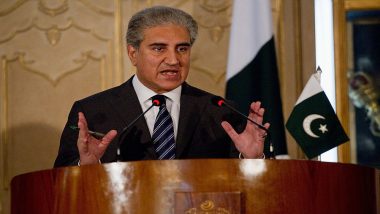Islamabad, Sep 8: Pakistan Foreign Minister Shah Mahmood Qureshi on Wednesday hosted the first ministerial meeting of Afghanistan's neighbours since the Taliban took over in Kabul, saying that even though the situation in the war-weary country is "complex and fluid", its "new reality" required the world to discard "old lenses" and proceed with a "realistic approach".
Qureshi issued a series of tweets as he chaired the first virtual meeting of Foreign Ministers of China, Iran, Tajikistan, Turkmenistan and Uzbekistan - the neighbours of Afghanistan.
Also Read | Xavier Novell, Spain’s Youngest Bishop, Resigns From Church to Enter Into Wedlock With Erotic Novel Writer.
“The situation in Afghanistan remains complex and fluid. We hope the political situation stabilises leading to normalcy soon. The new reality requires us to discard old lenses, develop new insights and proceed with a realistic/pragmatic approach,” he said in one of his tweets.
The situation in Afg remains complex & fluid. We hope the political situation stabilises leading to normalcy, soon. The new reality requires us to discard old lenses, develop new insights & proceed w/ a realistic/pragmatic approach https://t.co/FYrbrflCbN
— Shah Mahmood Qureshi (@SMQureshiPTI) September 8, 2021
The meeting comes a day after the Taliban unveiled a hardline interim government led by Mullah Mohammad Hasan Akhund, with key roles being shared by high-profile members of the insurgent group, including a specially designated global terrorist of the dreaded Haqqani Network as the interior minister.
Also Read | Moscow: Gas Explosion in Apartment Building in Noginsk, 2 Killed, 5 Injured.
He said that at the centre of the endeavours must remain the well-being of the Afghan people, who have suffered enormously due to conflict for over 40 years.
“In the wake of recent developments, the key priorities are to prevent a humanitarian crisis and to take steps to prevent economic meltdown,” he said.
He said that the participants agreed that peace in Afghanistan will help to “secure borders, end of threat of terrorism from Afghan soil, possibilities of dignified return of refugees to their land, economic stability and improvement in living standards and connectivity/greater regional eco integration.
He appreciated the positive and constructive response to Pakistan's proposal for a regional approach to respond to the evolving situation in Afghanistan.
“It cannot be stressed enough that this requires enhanced engagement of the international community, particularly at this pivotal juncture. Our collective voice to the int'l community will reinforce our message of a peaceful, stable and prosperous Afghanistan,” he said.
Earlier, Pakistan's Foreign Office said that the Foreign Ministers' meeting on the Afghan issue is taking place at the invitation of Pakistan.
The meet is expected to provide an opportunity to neighbours of Afghanistan to work together for a shared objective of a peaceful and stable Afghanistan, which is essential to forge strong economic linkages and realise connectivity agenda.
The meeting will build upon the discussions, held at the Special Representatives/Envoys level, on September 5.
China, along with Iran, Tajikistan, Turkmenistan and Uzbekistan, took part in the meeting hosted by Pakistan on September 5 to discuss the evolving situation in Afghanistan.
“The participants exchanged views mainly on the situation in Afghanistan, especially cooperation among Afghanistan's neighbouring countries on the Afghan-related affairs, and maintained communication with Russia, reaching much consensus," Chinese Foreign Ministry spokesman Wang Wenbin told a media briefing in Beijing about the September 5 meeting.
The neighbours of Afghanistan have a vital stake in the stability of the country. A peaceful, stable, united, sovereign and prosperous Afghanistan will contribute towards transit trade, people-to-people exchanges and security in the region.
The Taliban seized control of war-torn Afghanistan in mid-August, ousting the previous elected leadership which was backed by the West.
Pakistan has already said before the announcement of the caretaker government by the Taliban that it will not accord recognition to the new government on the basis of regional consensus.
(This is an unedited and auto-generated story from Syndicated News feed, LatestLY Staff may not have modified or edited the content body)













 Quickly
Quickly




















